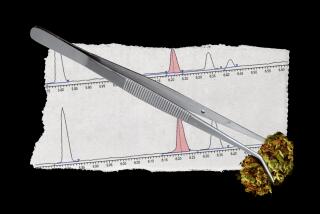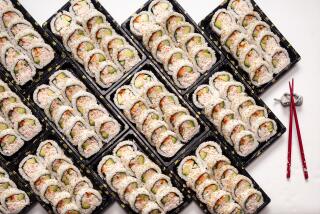Edible Luxury From the LabMicrobiologist Moshe Shifrine...
- Share via
Edible Luxury From the Lab
Microbiologist Moshe Shifrine has found what may be the closest thing to a license to print money: His California Truffle Co. in Woodland can grow unlimited quantities of one of the world’s rarest luxuries, an aromatic tuber that retails for a not-so-trifling $500 a pound.
The Northern California firm expects to produce 10 tons of lab-grown truffles this year and double that next year--all on 20,000 square feet of space. It requires no forests of ancient trees whose roots for no clearly understood reasons occasionally “host” truffles. Nor does it need trained pigs and dogs to sniff them out.
Quick to spot a good thing, Sanofi, a big food processor in France, signed a contract to buy about 80% of California Truffle’s annual “harvest” for use in products sold in Europe. The remaining 20% will be sold to restaurants and at such Southland retailers as Jurgensons, Bristol Farms (Pasadena and Rolling Hills), San Vicente Foods and the Wine House (West Los Angeles) and Purple Toes (Riverside), said spokesman Ken Reiff, whose family owns Orleans Hill Winery in Yolo County.
“We haven’t really gone out to the world yet,” Reiff said, “but this will change in a big way this week.” The company, he explained, is unveiling a fresh-frozen vacuum pack at the Winter Fancy Food and Candy Show in San Francisco’s Moscone Center through tomorrow.
At the moment, there is virtually no U.S. truffle market, Reiff noted. “The United States is an uneducated market at this point,” he said. “Truffles here are chocolate!”
That in mind, California Truffle last week started a “Truffle Hot Line” to answer questions and provide recipes: (800) 783-3505.
Haven Helps Drexel Accounts
It seems that not all of Drexel Burnham Lambert’s retail brokerage accounts were sold.
A handful of individuals are complaining that they’ve fallen into no-man’s land since Drexel decided to “wind down” its operations last month.
What happened is this: Smith Barney, Harris Upham & Co. bought the bulk of Drexel’s retail business late last year, but some 26,000 accounts held by institutions, employees and a few others were not sold. Then, when Drexel decided to liquidate, it sold this group of accounts to Shearson Lehman Hutton. But, for some reason, Shearson said it didn’t want some of the retail accounts, including at least a few held by individuals unrelated to Drexel.
Shearson, which took control of all the accounts for a two-day review, sent these unfortunate few back to Drexel. Drexel then transferred them to Kidder, Peabody & Co., which is apparently negotiating to transfer them yet again to Smith Barney.
“My account is like a South American dictator trying to find a safe haven in a foreign land,” complained Owen Blicksilver, a New York investor caught in the shuffle. “Nobody wants it.”
To add insult to injury, Blicksilver’s broker said he’ll have to sign at least four statements to approve the transfers. And he’s not sure from day to day where his little account has roamed. “If I wanted to sell a stock, I wouldn’t know which company to call on any given day,” he lamented.
More to Read
Inside the business of entertainment
The Wide Shot brings you news, analysis and insights on everything from streaming wars to production — and what it all means for the future.
You may occasionally receive promotional content from the Los Angeles Times.








